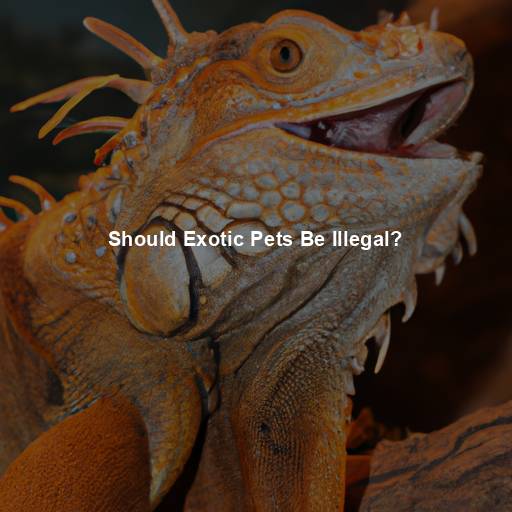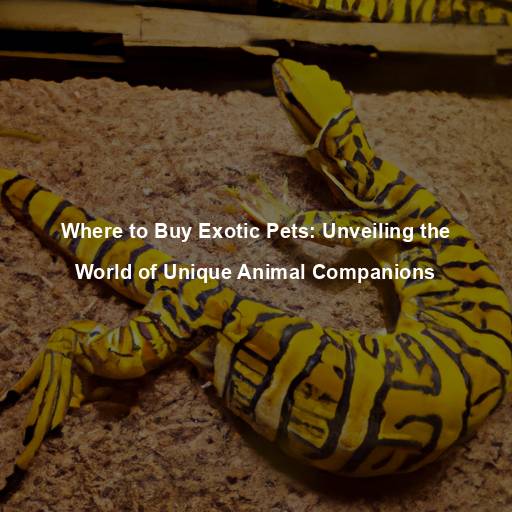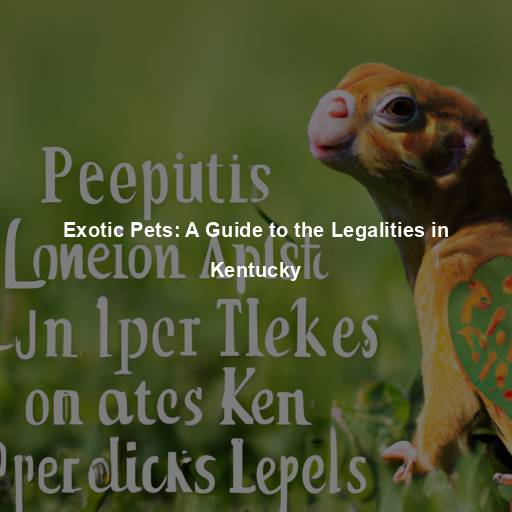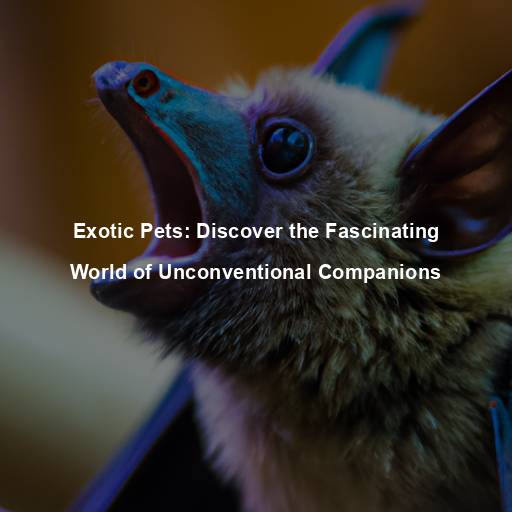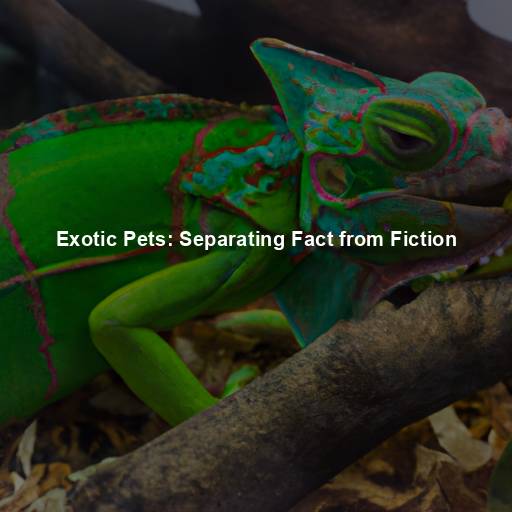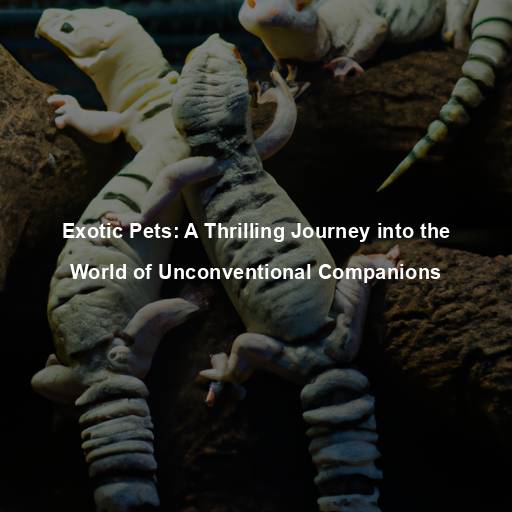Should Exotic Pets Be Illegal?
Last Updated on October 25, 2023 by Evan
Contents [hide]
- 1 The Fascination with Exotic Pets
- 1.1 The Appeal of Exotic Pets
- 1.2 The Dangers of Exotic Pets
- 1.3 Conservation Concerns
- 1.4 Ethical Considerations
- 1.5 Public Safety Concerns
- 1.6 Regulatory Measures
- 1.7 Education and Responsible Ownership
- 1.8 Finding a Balance
- 1.9 The Role of Captive Breeding
- 1.10 The Influence of Cultural Perspectives
- 1.11 Case Studies: Successes and Failures
- 1.12 The Role of Education and Awareness
- 1.13 International Collaboration and Legislation
- 1.14 The Human-Animal Bond
- 2 In Search of Solutions
- 3 Embracing Responsibility
- 4 FAQs: Should Exotic Pets be Illegal?
- 4.1 What are exotic pets?
- 4.2 Why should exotic pets be illegal?
- 4.3 Don’t some people take good care of exotic pets?
- 4.4 What about responsible pet owners who meet the requirements?
- 4.5 Can’t exotic pets help raise awareness for conservation efforts?
- 4.6 Are there any potential alternatives to a complete ban on exotic pets?
- 4.7 Where can I learn more about this topic?
The Fascination with Exotic Pets
The fascination surrounding exotic pets transcends the realms of the ordinary, transporting us to a world that is both beguiling and mysterious. It is in this realm where majestic big cats, vibrant reptiles, and tropical birds take center stage, weaving a tapestry of captivating allure that proves irresistible to many. Yet, the legality of owning such enchanting creatures is a subject of heated debate, with passionate arguments relentlessly surfacing from opposing perspectives. Join us in this riveting exploration as we unravel the intricate layers of this perplexing issue, dissecting the potential repercussions that emerge from embracing or forbidding the ownership of these extraordinary companions.
The Appeal of Exotic Pets
Exotic pets offer a sense of novelty and adventure that traditional pets may not provide. Their striking physical features, uncommon behaviors, and rarity make them intriguing companions for those seeking an extraordinary bond. Some argue that owning an exotic pet can be a rewarding experience, as it allows individuals to connect with nature in a profound way and gain a deeper understanding of different species.
The Dangers of Exotic Pets
Owning an exotic pet may seem like stepping into a thrilling realm of untamed beauty, but let’s not overlook the murky waters that lie beneath the surface. These captivating creatures often come with a perplexing set of demands that can baffle even the most well-meaning owner. Their insatiable appetites, intricate living arrangements, and need for social interaction can send even the most dedicated caretaker into a state of bewilderment. And let’s not forget the truly spine-tingling danger that arises when venomous snakes and mighty carnivores enter the equation – a hazardous situation that begs for nothing less than a dose of breath-catching responsibility.
Conservation Concerns
The intricate web of consequences intertwined with the exotic pet trade leaves us in a state of perplexity. Looking beyond the surface, we must unravel the turbulent knot tying the demand for rarity to the plight of wildlife conservation. The insidious shadow of illegal wildlife trafficking looms large, casting a dark cloud over our efforts to protect and preserve our planet’s fragile ecosystems. Advocates for more stringent regulations propose that by extinguishing the flame of ownership for exotic pets, we might ignite a glimmer of hope for endangered species on the brink of exploitation.
Ethical Considerations
The captivating world of exotic pets has become a swirling vortex of ethical ponderings. On one hand, enthusiasts argue that conscientious guardianship and meticulous nurturing can bestow a life of contentment upon these extraordinary creatures. Yet, on the opposite end of the spectrum, a tumultuous debate rages on, questioning the morality of confining such majestic beings within the confines of human dwellings. These exotic animals, with their intricately evolved adaptations and intricate needs, face a confounding challenge when thrust into the realm of captivity.
Public Safety Concerns
Owning exotic pets is like navigating through a wilderness of uncertainty, where danger lurks and leaps unexpectedly. While a handful might flaunt their gentle demeanor, others conceal a menacing prowess that can wreak havoc on unsuspecting owners and innocent bystanders alike. The tales of escaped and maltreated exotic animals stand as haunted reminders of the chaos that can ensue, bringing harm and despair in their wake. It is an undeniable truth that the safety of individuals and communities hangs in the balance – a precarious tightrope between legality and the sinister allure of owning these captivating creatures.
Regulatory Measures
To address the complexities surrounding exotic pets, various regulatory measures have been implemented by different jurisdictions. These measures aim to strike a balance between preserving the welfare of animals, protecting public safety, and addressing conservation concerns. Some countries have outright banned the ownership of certain exotic species, while others require permits, licenses, or stringent guidelines for their ownership. These regulations attempt to ensure that only qualified individuals with the necessary expertise can care for exotic animals responsibly.
Education and Responsible Ownership
One essential component in the debate over exotic pet ownership is education. Increasing awareness about the specific needs and challenges associated with caring for exotic pets can help potential owners make informed decisions. Promoting responsible ownership through educational programs, mandatory training, and stringent screening processes can help mitigate the risks and ensure the welfare of both the animals and the public.
Finding a Balance
In the end, the question of whether exotic pets should be illegal is a complex one without a simple answer. Striking a balance between individual freedoms, animal welfare, and public safety is a delicate task. It requires thorough consideration of scientific research, expert opinions, and societal values. While some argue for a complete ban on exotic pet ownership, others advocate for more stringent regulations and responsible ownership practices.
The Role of Captive Breeding
One aspect often discussed in the context of exotic pet ownership is the role of captive breeding. Proponents argue that captive breeding programs can help meet the demand for exotic pets while reducing the impact on wild populations. They believe that responsible breeders can ensure better care, genetic diversity, and disease control. However, critics argue that even with captive breeding, the inherent challenges of meeting the complex needs of exotic animals in a domestic setting persist.
The Influence of Cultural Perspectives
Cultural nuances have an undeniable influence on how we perceive the ownership of exotic pets. Across various cultures, the allure of owning a tiger or a monkey extends beyond mere companionship, becoming a statement of social standing and opulence. These cultural perspectives inevitably fuel the demand for exotic pets, making it an intricate task to regulate or even eliminate their ownership. In order to tackle this complex issue, it is imperative to delve into the depths of these cultural influences and develop solutions that simultaneously consider diverse traditions and the welfare of these captivating creatures.
Case Studies: Successes and Failures
Exploring real-life scenarios allows us to delve into the complex world of exotic pet ownership and unravel the intricate web of cause and effect. In our quest for understanding, we uncover intriguing tales of success and perplexity. A prime exemplar lies within the borders of Belgium, where a ban on dangerous exotic animals in 2003 bestowed upon society a tangible reduction in untoward incidents. Likewise, the sunburnt land of Australia shines as a beacon of regulation and vigilance, where the surrender of exotic companions to shelters witnesses a delightful decline.
The Role of Education and Awareness
Understanding the significance of education and awareness is vital in crafting public views and encouraging responsible ownership. A wealth of knowledge regarding the unique requirements and obstacles involved with exotic pets empowers potential owners to make informed choices. Through education, the propagation of false beliefs and misunderstandings surrounding these animals’ behavior and habitat needs can be debunked, fostering a deeper comprehension. Moreover, advocating for alternatives, such as backing conservation endeavors or visiting accredited establishments like zoos and sanctuaries, offers a responsible and ethical way for individuals to encounter and appreciate these captivating creatures.
International Collaboration and Legislation
Given the global nature of the exotic pet trade, international collaboration and legislation are essential to address the challenges it poses. Cooperation among countries can help combat illegal wildlife trafficking networks and enforce stricter regulations. International agreements, such as the Convention on International Trade in Endangered Species of Wild Fauna and Flora (CITES), aim to regulate the trade in endangered species and provide a framework for conservation efforts. Strengthening and enforcing these international agreements can contribute to a more comprehensive approach to the issue of exotic pet ownership.
The Human-Animal Bond
In the midst of ongoing discussions regarding the treatment of exotic animals, it is baffling to overlook the profound connection between humans and these extraordinary creatures. Countless individuals find solace and delight in the companionship of their unconventional pets, forging a bond that transcends the ordinary. This indescribable connection has the potential to enhance mental well-being and cultivate a sense of fulfillment. Yet, it remains crucial to navigate this uncharted territory with the utmost care, ensuring that the well-being of these extraordinary animals is not sacrificed and that public safety remains a paramount concern.
In Search of Solutions
Finding solutions that strike a balance between the various considerations surrounding exotic pet ownership is a complex task. It requires a comprehensive approach that takes into account scientific research, expert opinions, cultural perspectives, economic considerations, and regulatory frameworks. Some potential avenues for addressing the issue include:
Strengthening Regulations
Implementing stricter regulations and licensing requirements for exotic pet ownership can help ensure that only individuals with the necessary knowledge, resources, and commitment can care for these animals responsibly. These regulations should be enforced rigorously, with severe penalties for non-compliance.
Promoting Ethical Alternatives
Promoting ethical alternatives to owning exotic pets, such as supporting conservation initiatives, visiting accredited zoos and wildlife sanctuaries, and engaging in responsible ecotourism, can provide individuals with opportunities to appreciate and experience these animals in a more appropriate setting.
Education and Awareness Campaigns
Education and awareness campaigns hold the key to unveiling the enigmatic world of exotic pet ownership, unraveling its risks, challenges, and ethical quandaries that confound both enthusiasts and the public alike. By skillfully honing in on potential owners and the wider community, these campaigns serve as a guiding light, illuminating the intricate intricacies that surround these curious creatures. Ultimately, they aim to cultivate a sense of responsibility, fostering a holistic understanding and impeccable ownership practices.
International Collaboration
In our interconnected world, tackling the complexities surrounding the illicit trade of wildlife and the regulations surrounding exotic pet ownership requires a united front. By fostering international collaboration and encouraging cooperation, we can pave the way for innovative solutions to address the perplexing challenges at hand. Sharing best practices, invaluable information, and harmonizing efforts across borders will undoubtedly bolster our collective ability to combat this issue on a truly global scale. It is through this collaborative burst of effort that we can hope to make a tangible difference and protect the vulnerable creatures that share our planet.
Research and Conservation Efforts
When it comes to exotic animals, delving into the realm of scientific research and conservation efforts proves to be an awe-inspiring avenue. Engaging in this realm provides us with a kaleidoscope of valuable insights that unravels the mysterious needs and well-being of these captivating creatures. Through an intricate tapestry of knowledge surrounding their natural behaviors, habitat requirements, and conservation status, we can venture into a realm of informed decisions concerning their ownership and unwavering protection. Jump into this mind-boggling world, and prepare to be mesmerized by the enchanting discoveries awaiting your exploration.
Embracing Responsibility
The debate surrounding the legality of exotic pets is a complex and multi-faceted issue that defies easy answers. It necessitates a deep comprehension of the multitude of factors involved and a commitment to making well-informed choices. Striking a delicate balance between animal welfare, public safety, conservation efforts, and personal liberties proves to be a challenging undertaking, one that calls for extensive cooperation, extensive education, and thoughtful contemplation. By embracing a culture of responsibility and adopting a comprehensive approach, we can aspire to a future where our fascination with exotic pets harmoniously coexists with the imperative to safeguard these remarkable creatures and ensure the overall welfare of our society.
FAQs: Should Exotic Pets be Illegal?
What are exotic pets?
In the realm of unconventional companions, we delve into the captivating world of exotic pets. From vibrant reptiles to captivating birds, mysterious amphibians to intriguing mammals, and even the bizarre realm of exotic insects and arachnids, this diverse menagerie is far from ordinary. Their allure lies in their distinctiveness, boasting uncommon features, peculiar behaviors, and fascinating origins, often originating from far-off lands across the globe.
Why should exotic pets be illegal?
The debate surrounding the legality of exotic pets has taken center stage, perplexing experts and animal lovers alike. On one hand, it is argued that certain captivating creatures should be deemed illegal due to the arduous task of meeting their intricate care requirements. The complexity lies in mimicking their natural habitats and adapting to their environmental needs, an undoubtedly baffling challenge when attempted within the confines of a domestic setting. Alarmingly, the ignorance or absence of specialized knowledge can lead these fascinating beings down a path of misery, plagued by health concerns, malnourishment, and alarming behavioral patterns.
Don’t some people take good care of exotic pets?
Caring for exotic pets is a deeply nuanced endeavor, where the line between responsible guardianship and potential harm can often blur. Despite the good intentions of a select few, the intricacies involved in providing sufficient care for these extraordinary creatures can prove overwhelming for many individuals. Moreover, the very act of adopting these animals as pets inadvertently fuels the illicit market of wildlife trafficking, further exacerbating concerns about conservation efforts and the well-being of these species in their native environments.
What about responsible pet owners who meet the requirements?
While responsible pet owners who meet proper care requirements for exotic pets do exist, it is difficult to realistically monitor and enforce these standards across the entire population of exotic pet owners. The risks associated with allowing the general population to keep exotic animals outweigh the benefits in most cases. Consequently, implementing a blanket ban on exotic pets helps protect these animals’ welfare and conservation while preventing potential harm to both the animals and their owners.
Can’t exotic pets help raise awareness for conservation efforts?
It’s no secret that people are fascinated by the allure of exotic pets. These captivating creatures can ignite our curiosity and make us yearn for a connection to the wild. However, it’s crucial to take a step back and consider the bigger picture. Experts and organizations dedicated to conservation urge us to prioritize responsible and ethical ways of appreciating and protecting wildlife. By supporting initiatives that promote observing animals in their natural habitats, backing conservation projects, and spreading awareness about ecosystem preservation, we can make a genuine and lasting impact on safeguarding endangered species. Keeping exotic pets, though intriguing, often muddles these efforts by fueling the demand for wild-caught animals, endorsing unsustainable practices, and even inadvertently aiding illegal trade.
Are there any potential alternatives to a complete ban on exotic pets?
In a fascinating twist, certain countries and regions have opted for a more nuanced approach when it comes to exotic pets. Rather than a simple ban, they have devised intricate systems of strict regulation and licensing to maintain a semblance of order in this untamed realm. Brace yourselves for a whirlwind of educational courses, permits, and inspections that seek to ensure that these majestic creatures receive the utmost care and welfare. Yet, amidst the whirlpool of challenges related to enforcement and uniformity, the allure of an all-encompassing ban beckons to those in authority, dangling a tantalizing solution.
Where can I learn more about this topic?
When embarking on the journey of understanding the complex world of exotic pets and their legalities, it is imperative to seek wisdom from esteemed sources. By delving into scientific organizations, wildlife conservation groups, and government websites dedicated to animal welfare and wildlife management, one can unearth a wealth of knowledge. These reputable sources will shed light on the multifaceted challenges and crucial considerations associated with owning exotic animals as pets, while also unmasking the potential repercussions for both conservation endeavors and the well-being of these unique creatures.

